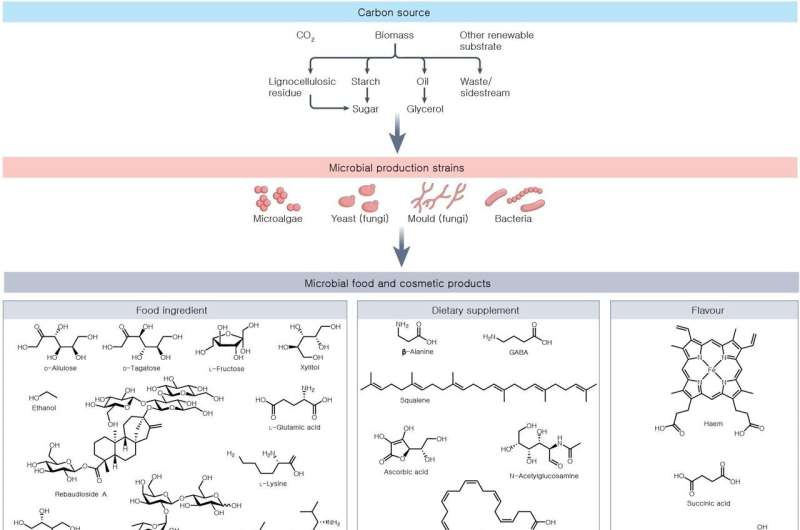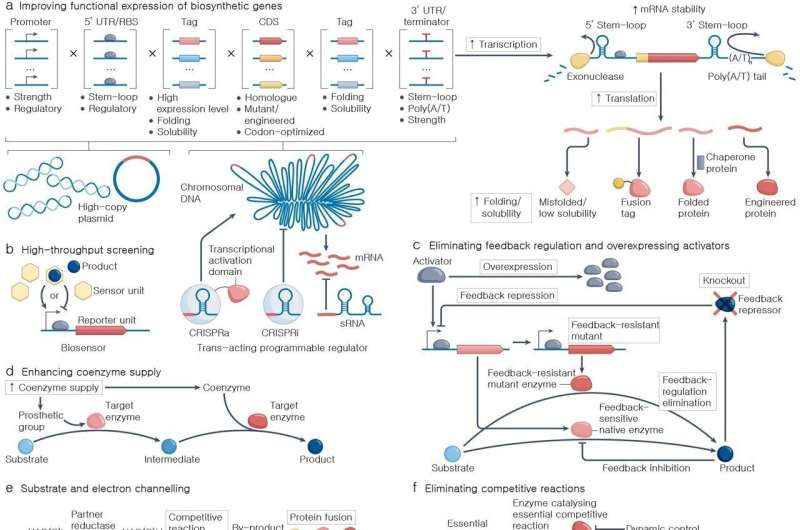
Despite decades of global population growth, a global food crisis seems to be imminent again. Food productivity has been cut severely due to prolonged abnormal weather from intensifying climate change. In addition, the global food supply chain has deteriorated due to international conflicts such as wars, exacerbating food shortages, and nutritional inequality around the globe.
At the same time, however, as awareness of the environment and sustainability rises, an increase in demand for more eco-friendly and high-quality food and beauty products is being observed. For this reason, microorganisms are attracting attention as a key that can handle these different problems.
Kyeong Rok Choi, a research professor of the Bioprocess Research Center and Sang Yup Lee, a distinguished professor of the Department of Chemical and Biomolecular Engineering, published a paper titled, “Metabolic Engineering of Microorganisms for Food and Cosmetics Production,” in Nature Reviews Bioengineering.
“Systems metabolic engineering” is a research field developed by Professor Sang Yup Lee of KAIST to more effectively develop microbial cell factories, a core factor of the next-generation bio industry to replace the existing chemical industry that relies heavily on petroleum.
By applying a systemic metabolic engineering strategy, the researchers have developed a number of high-performance microbial cell factories that produce a variety of food and cosmetic compounds including natural substances like heme and zinc protoporphyrin IX, compounds which can improve the flavor and color of synthetic meat; lycopene and β-carotene, which are functional natural pigments that can be widely used in food and cosmetics; and methyl anthranilate, a grape-derived compound widely used to impart grape flavor in food and beverage manufacturing.
In this paper, the research team covered remarkable cases of microbial cell factories that can produce amino acids, proteins, fats and fatty acids, vitamins, flavors, pigments, alcohols, functional compounds and other food additives and cosmetics.
Furthermore, the paper organized and presented systems metabolic engineering strategies that can spur the development of industrial microbial cell factories that may produce more diverse food and cosmetic compounds in an eco-friendly way with economic feasibility.

For example, producing proteins or amino acids with high nutritional value through non-edible biomass used as animal feed or fertilizer through the microbial fermentation process could contribute to an increase in production and stable supply of food around the world. Furthermore, developing more viable alternative meat, further reducing dependence on animal protein, could also contribute to the reduction of greenhouse gases and environmental pollution generated through livestock breeding or fish farming.
In addition, vanillin or methyl anthranilate, which give off vanilla or grape flavor, are widely added to various foods, but natural products isolated and refined from plants are low in production and high in production cost, so in most cases, petrochemical substances derived from vanillin and methylanthranilic acid are added to food. These materials can also be produced through an eco-friendly and human-friendly way by harnessing the power of microorganisms.
Ethical and resource problems that arise in producing compounds like Calmin (cochineal pigment)—a coloring added to various cosmetics and foods such as red lipstick and strawberry-flavored milk, which must be extracted from cochineal insects that live only in certain cacti—and Hyaluronic acid (which is widely consumed as a health supplement, but is only present in omega-3 fatty acids extracted from shark or fish livers) can also be resolved when they can be produced in an eco-friendly way using microorganisms.
KAIST Research Professor Kyeong Rok Choi, the first author of this paper, said, “In addition to traditional fermented foods such as kimchi and yogurt, foods produced with the help of microorganisms like cocoa butter, a base ingredient for chocolate that can only be obtained from fermented cacao beans, and monosodium glutamate, a seasoning produced through microbial fermentation are already familiar to us.”
“In the future, we will be able to acquire a wider variety of foods and cosmetics even more easily produced in an eco-friendly and sustainable way in our daily lives through microbial cell factories.”
Sang Yup Lee said, “It is engineers’ mission to make the world a better place utilizing science and technology. Continuous advancement and active use of systems metabolic engineering will contribute greatly to easing and resolving the problems arising from both the food crisis and the climate change.”
More information:
Kyeong Rok Choi et al, Systems metabolic engineering of microorganisms for food and cosmetics production, Nature Reviews Bioengineering (2023). DOI: 10.1038/s44222-023-00076-y
Provided by
The Korea Advanced Institute of Science and Technology (KAIST)
Citation:
Systems metabolic engineering: Microbial cell factories as a source of eco-friendly food and cosmetic coloring (2023, July 31)
retrieved 31 July 2023
from https://phys.org/news/2023-07-metabolic-microbial-cell-factories-source.html
This document is subject to copyright. Apart from any fair dealing for the purpose of private study or research, no
part may be reproduced without the written permission. The content is provided for information purposes only.










